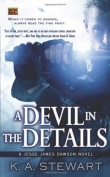
Текст книги "Devil to the Belt (novels "Heavy Time" and "Hellburner")"
Автор книги: C. J. Cherryh
Жанр:
Научная фантастика
сообщить о нарушении
Текущая страница: 6 (всего у книги 45 страниц)
Best of all, you could pay a call on an old classmate from the Institute, break the queue andget the precise by-the-book words on the application.
8-deck was transient and gray and lonely: you might see a handful of miners in from their runs, not to mention the beam-crews and the construction jocks and whoever else worked long stints in null; you saw the occasional Shepherds and ‘driver crews, transiting to their own fancy facilities, and a noisy lot of refinery tenders and warehouse and factory workers and dock monkeys on rest-break (there were a lot of refinery operations on 8)—and sometimes, these days, some of the military in on leave—but you didn’t get anything like the flashy shops or the service you had down on helldeck. Here you kind of bounced along between floating and walking, being careful how fast you got going, being careful of walls and such—your brittle bones and your diminished muscles and your head all needed to renew acquaintances with up and down—slowly, if you were smart.
The public part of 8 was all automats, even the sleeperies—no enterprising station freeshop types behind the counters, even for the minim shifts that Health & Rehab would let a stationer work on 8. It was robot territory, just stick your card in a slot and you got a sleepery room or a sandwich or the swill that passed here for bourbon whiskey: but that was all right for a start, everything was cheaper than helldeck and your whole sense of taste was off, anyway, for the first bit you got used to refinery air.
You found no luxury here that didn’t come out of an automatic dispenser, unless you were working for the company—in which case you saw a whole other class of accommodations, the adverts said: they said a whole lot better came out of the vending machines behind those doors—but Bird had never seen it. ‘Driver crew and Shepherds didn’t need the waystops that miners did—if they were up here they were slumming, on a 1-hour down from some business in the mast; but generally they went straight to helldeck, where big ship officers and tech crew had cushy little clubs and free booze, and Access with all sorts of perks on the company computers.
Adverts said you could get at least a sniff of those perks, even as a miner—if you let the company own your ship and provide your basics; but that meant the company could also decide when you were too old or you didn’t fit some profile, and then you were out, goodbye and good luck, while some green fool got your ship. God help you, too, if Mama decided you weren’t prime crew on that ship, and some company-assigned prime crew got shunted out to work tender-duty for three years at a ‘driver site—which effectively dumped all the relief crews back at the Refinery onto the no-perks basics, to do time-share in a plastics factory. Work for the company and you could fill in your time swabbing tanks in the chemicals division til you got too old, and then they set you down on retirement-perks and let you sweep floors in some company plant to earn your extras.
Hell, no. Not this old miner.
But a lot of years he had been coming back to 8, and he’d seen changes—or maybe he had felt livelier once upon a time. 8 these days echoed to footsteps, not to music and voices. The bright posters had all gone years ago, the month the company had gone over to paperless records-keeping. The company favored gray paint or institution green, except for pipes that came wrapped with hazard yellow and black.
You used to get the unofficial bills here too, the pasteups that would appear overnight—saying things like TOWNEY LIES and FREE PRATT & MARKS—Mama hadn’t liked those in the best days, nossir, the bills that said things like EQUAL ACCESS and the take-one flyers that used to give you the news the company wouldn’t. They’d all gone. No paper.
You still found the old barred circle, you still found PEACE and FREE EMIGRATION scratched in restroom plastic, right alongside the stuff you could figure Neanderthals must’ve carved in Stone Age bathrooms—you found MINIM and RABRAD and SCREW THE CORP, along with other helpful suggestions in the toilets… far more frequent here than down on helldeck, he guessed because sanding down the panels in light gmade a bitch of a lot of dust, and spray paint was as bad. Or maybe it was because Security didn’t come up here much and the ordinary maintenance crews were contributing to it too. So the crud and the slogans stayed in the bathrooms, not even covered by paint, while 8-deck got nastier and dirtier and showed its age like some miners he knew.
He was in a sour mood—maybe the cops, maybe Ben’s stupid chance-taking with the datacard, maybe just that he was tired of the shit and tired of feeding a company that was trying to blow itself to hell; and right now specifically because the cops had their Personals, which meant he was stuck in the stimsuit and his day-old coveralls until the cops turned his kit loose: damned if he was going to buy new knee and ankle wraps at vending machine prices.
But he did buy a bottle of aspirin, a cheap men’s personals pack, and a far too expensive bottle of cologne: the hips were gone, the ankles were going, the hair was gray and thinning, but the essentials still worked and he did have hopes. He walked into the bar in the front of the ambitiously named Starbow Hotel and, with his card in the slot at the desk, punched Double and Guests Permitted.
In the midst of which transaction somebody grabbed him from behind and swung him around, clean off his feet.
“Hey!” he yelled, as the turn brought him face to face with dusky-skinned Sal Aboujib, who grabbed him the same as the one behind—
That hadto be Meg Kady.
He hugged Sal back in this bouncing unstable minim– gdance. He said, “Damn, you’re both fools!”
But he’d hoped with all his heart they’d got his message.
“Old friend of Marcie Hager’s,” Ben said at the counter, down in Records. “Is she in?”
The clerk looked over his shoulder, looked at him, looked at the line that stretched out the door, said, uncertainly: “She might be.”
“Thanks,” he said warmly, smiled, and on an adrenaline rush and a dogged determination not to show the pain, walked cheerfully past the counter, through clerk territory and on back to the hallway: men in good suits didn’t stand in that line. Ben Pollard didn’t. He walked as far as an office that said M. Hager, Technical Supervisor, wiped the sweat off his face, rapped on the door, opened it and leaned in the doorway.
“Hello there, beautiful.”
Marcie Hager looked up from the desk, looked nonplussed for an instant. Then: “Ben Pollard. God, I thought you’d shipped out to Mars or something.”
“Mind if I sit?”
She said, after a second’s consideration, “Of course not. Come on in. Coffee?—Are you all right? You’re white.”
“First day back. Came down from 8.—You’re looking good.”
“Last time I saw you, you were in Assay.” Marcie got up, poured two instant coffees. “White? Sugar?—Back from where?”
“White. Plain.—Assay for a while. Then I bought into a ship.”
Marcie’s brows went up. Estimation of his finance clearly did. So did her interest. “Social call?”
He grinned, sat down with the coffee, said, after a deliberately slow sip, “I ran into a piece of luck. I thought you might be able to help me.”
You went to the company school, you learned what bought what from whom: some were cheap and some cost more than a freerunner could possibly pay, but you always kept track of your old classmates and, on call, you did favors such as Marcie Hager was about to—because favors got you favors, and that, for one thing, meant he didn’t have to stand in that line.
“Yeah?” Marcie said, and sat down and sipped her own coffee. “Sounds interesting.”
Meaning Marcie thought somebody with a ship equity four years out of school just might be going somewhere even a Technical Super in Records might find useful—even if freerunning was as high-risk an investment as there was, it was disposable cash and high-interest returns in the short term; and it was capital that a Technical Super in Records, with all her Access perks, couldn’t lay hands on—
But not as if Marcie was going to ask cold cash for favors. In Marcie’s position, subject to company scrutiny, you never left a datatrail.
“Just a little expediting. A claim for salvage. I don’t want to be at the bottom of the list of creditors. This guy owes us, big.”
Marcie’s left eyebrow titled. “Like in—major salvage.”
“Ship salvage.” He leaned back, eased a very sore set of muscles in his back, took another slow sip of coffee. “Number’s One’er Eighty-four Zebra.”
“Mmmn. Not from this zone, Benjie. That’s a longprocedures delay. Where in hellhave you been?”
“Yeah, well,—but—” He turned on his nicest smile. Rule One: you didn’t deal in plain words. Rule Two: you were careful about cash. Rule Three: you didn’t ask favors of prigs—but Marcie certainly wasn’t that.
Marcie said, “Just so you know,” and turned on her terminal. Marcie’s kind might not trade in cash, but Marcie said, while she was idly tapping her way through a chain of accesses, “What ever happened to Angie Windham, you know?”
“Don’t know. But you know Theo Pangoulis went bust? He bet everything he had on that shop—could have told him nothing succeeds in that location.”
Marcie scowled. That wasn’t the kind of offering you gave: they were seriously negotiating now, and her fingers stopped moving.
He said, “On the other hand, I do hear from Harmon Phillips.”
“Do you?”
“You know he’s on Aby Torrey’s staff. Up in Personnel.”
“That’s interesting,” Marcie said. “—Have you got your numbers ready?”
It was swill, but there was genough to keep it in the glass and you in your seat if you sat easy, and there was sure as hell good company—the two prettiest sights in the belt, Bird swore: Soheila Aboujib, a grin gleaming on her dark face, her ears and fingers aglitter with her reserve bank account, laughed, elbowed Meg in the ribs and said, “He’s been out there too long.”
“Let me tell you,” he said—and did, in the light traffic of the Starbow’s autobar: they were in a crowd of dockers and tender– and pusher-jocks. The piped music adjusted itself up, affording a little privacy to people at the back corner table.
“Yow,” Meg said, when she had the essentials. “So Ben’s down in Admin, is he?”
“If he didn’t break a leg,” he said. “I tell you, I’m worried about him. He’s been acting like a crazy man from the time we linked on with that ship.”
“I dunno.” Meg was what the young folk called rab, and the hairdo this time was what his generation called amazing, shaved bare up the sides, red as fire atop, a mass of curls trailing down her neck and all these bangles on her ears. With Meg you’d never know what you’d see—sometimes it was braids and sometimes that hair turned colors. Meg Kady, she was, Hungarian on one side, Sol Station Irish on the other, Meg said—but sometimes it was Scots; and once, overheard in a bar, she’d said it was Portuguese Martian. God only knew about Sal Aboujib, who had a coffee complexion and coffee-black eyes: with Sal it was braids today, a hundred of them, with metal clips, but you never knew—sometimes that hair changed styles and colors too.
Either one of them was too pretty for a gray-haired, brittle-boned old wreck—had to be his brains they were after picking, he was sure: get him drunk and ask him questions, buy a dinner and try to get specific coordinates out of glum, close-to-the-chest Ben—neither one of which had ever been too successful. But you never figured what made friends: you just took up with people, found out who you could trust, and if you found a good one you kept those contacts polished, that was all—never could remember how they’d taken up with him—well before Ben, back when he’d been working with various hire-ons, something to do with a mixed-up drink order (he’d been far gone and so had they) and a game of pitch-the-penny in quarter gwith a crowd of equally soused tender-jocks.
Never could remember who’d finally gotten the bill.
“From over the line?” Meg asked, regarding the strayed ship, and he said, “One’er number. Clean-talking kid, real young, maybe twenty, twenty-two. Partner’s dead out there. Tank blew. His partner was outside.”
“Brut bad luck,” Sal said with a shake of her braids. A little grimace. Then: “You seriously got rights on that ship?”
“Ben thinks so. Thinks so enough to risk his knees. He’s been working out for weeks. I figured he was going to pull this, but I did think he’d at least check in first.”
Meg said: “Want us to track him? We’ve been scuzzing along on 6, in no hurry, figuring on a friend showing up—could’ve done 3 two days ago. We can go down…”
“He’ll get back. If he doesn’t I’llcall the hospital.”
“You two feuding?”
“Ben gets a little over-anxious.”
“Yeah, well. That’s Ben.—But if it worked, if you did get salvage—can you just take the ship?”
“It’s not going to work. Company’ll find an angle. You watch.”
“Que sab?” Meg said. “But if it did—”
“Meg, he’s been damn crazy. Ever since we found that ship. I tell you, I was afraid—” He’d been too long away from a drink. He hadn’t dared indulge, on the return trip, and this one hit him like a hammer. He almost said: Afraid of him,—but that word could get back to Ben, and he didn’t want that. He said, instead, “Ben works real hard. But sometimes he gets to looking most at where he’s going, not what he’s doing.”
Meg reached out and laid a hand on his arm. “Yeah, well, cher, you want us to talk to him?”
“No, no, it’s between him and me. Let him get this bug out of his works. He’s going to find nothing but a string of bills to that ship’s account. It’s probably in hock for its last fuel bill. If we get expenses I’ll be happy.”
“Can’t blame him for trying,” Sal said. “Hell, I’d brut kill for a chance like that.”
You never knew on some things whether Sal was kidding.
“Look,” Meg said, squeezing his wrist. “What say you screw the med-regs, cancel here and come down to 6 with us?”
“Meg, my old knees—”
“Old, hell. We got a nice berth there at the Liberty Bell. You just stay here and collect Ben when he comes in. We’ll party tonight. Get the spooks out. We knew we were waiting for somebody.”
“Yeah,” said Sal. “Just give us a little time to clean up the room.”
“Clean up, for God’s sake—what are we? Strangers?”
Meg elbowed his arm, getting up. “Hey, we just got to get a few things out of it. Female vanity.”
He gave a shake of his head and sipped his bourbon. A few things out of the room. The things might well be male. But he charitably didn’t suggest that.
And it was (charitably) true Meg and Sal might do some feminine fussing-up in the place; and it was no real surprise that Meg and Sal might bounce a casual acquaintance or two in favor of him and Ben—they were simpatico, for some reason God only knew; they were also on Trinidad’slease-list, though they were just in themselves, and in no position to take a ship out for another month or three.
“See you below,” they said, and went.
Pretty woman like that could’ve talked him down to helldeck tonight if she’d insisted: pretty woman like that—
Who lied like a company lawyer.
Meg was an ex-shuttle pilot, native to Sol Station (or Mars)—accused at Sol Station of political agitation (or arrested for smuggling, depending on how many Meg’d had). Either one in fact could’ve gotten her deported down to the motherwell if they’d gotten the evidence she’d evidently managed to dump. In either case, the company had (she said) invited her to leave places conveniently close to sources of luxuries. Meg had taken up with Sal when she got here—Sal herself had gotten bounced out of Institute pilot training, Sal never had said why, but it didn’t matter: there were a number of things Sal wouldhave done, and you could take your pick. Sal was smart, she’d had at least her class 3 license, and by his reckoning, she had what the good numbers men had: she went past the numbers to seethe Belt in her head. It was formal schooling and experience Sal lacked—and the way Sal had been getting it, in the School of Last Resort, you just hoped to live long enough.
He was sure the pair skimmed, occasionally—just clipped a little off another freerunner’s tag if they didn’t know him personally.
But not from their friends. Or if they had—he figured they’d pay it back when they had it to pay and never tell you they stole it. That was the kind they were, even Sal, who was real loose about a lot of things, and he counted that honest. Everybody got desperate enough sometime. He’d done it himself once or twice or three. And paid it back to the guys he’d done it to, without ever telling them he’d done it. He understood that kind of morality.
So he’d lease Trinidadto Meg and Sal now and again—a classier ship than they could generally get, with equipment other rigs didn’t have. They were learning. They took advice. He’d lease to them this time, if they’d been ready to go—he likedthem, that was reason enough.
But all of a sudden there was this other ship: he’d seen that idea light up in their eyes—that if by some stroke of cosmic luck they did get a second ship, then somebodyhad to be leasing it, didn’t they, maybe on a primary basis? Surely he wasn’t going to sell it to the company. God only how far their imaginations took those two.
Damn, he asked himself, what was the jinx on that ship, that it made Ben crazy and now it had Meg and Sal thinking about something they just weren’t damn-all good enough yet to ask for?
While nobody gave two thoughts to the poor sod in hospital who was screwed out of everything he had, not to mention the owners and the lease crews over at Rl who might be screwed.
Sometimes he thought he was too old and too far from his beginnings. Sometimes he dreamed about pine trees and sagebrush and sunsets.
But he dreamed very realistically about poverty too—recalled what it was to scrape and save to get up to space for schooling; then by desperation and some fast talking to make it out to Asteroid Exploration, Inc., to a program that let you lease-purchase: they’d been that desperate for miner pilots then, desperately looking, in the start-up of the current push.
Most of them that had come out then were probably dead now: he knew about the ones on R2, and he was the last of that lot. The plain station labor that had gone into refinery jobs and processing—God only: maybe a lot of them were dead too. He remembered young faces; he remembered the talk about what they were going to find, how they were all going to get rich on company wages.
Yeah. And now that the mapping was mostly done and the company had its ‘drivers working real smoothly, the company didn’t want the freerunners anymore. E-co-nomics, they said. Freerunners didn’t fit the system the way it had grown to be, all company-run, and ASTEX stacked the deck any way it liked. You couldn’t complain and you couldn’t get clear—because that took money you didn’t have; or if you did sell your ship back to the company you got to Sol Station with, after passage, 50, 60 k in pocket, back at your starting place aged 50 plus with your bones all brittle and that 60 k all you had for your retirement and your medical bills.
But he read his brother’s letters and he knew beyond a doubt that thirty years was too long an absence for anyone: Earth had changed, attitudes had changed—people worried about things that didn’t worry him and they didn’t worry where he knew they should. Earth was at war with its colonies, shooting hell out of human beings, while Earth-folk argued whether the eetees at Pell had souls, and blamed the government for the market crash when company merchant ships went on strike about the damn visas. You had the rabs walking around in shave-jobs and glitter and scrawling slogans because society was going to hell and the human race with it; you had the Isolationists who wanted to shut down the far star-stations and not speak to anybody but Earth and Mars and the Belt; and you had the Federationists and the Separationists and the pacifists and the neo-nationalists and the New Evangelicals all of whom thought they knew how to reform the human race; you had the Euconomists and the anti-geneticists and the ones that claimed there was a youth drug from space that the governments had embargoed, but the rich could still get it; and you had various defense departments in the United Nations and United Internationals building those bloody huge warships to enforce the embargoes against the rebels in far space, while the Free Trade Party that had won the election in the PanAsian Union wanted to get rid of all the embargoes, cancel the visas and let people go where they wanted to go—but out there in deep space things changed, things changed constantly, faster than anybody could keep up with. He had not quite been born when somebody out at Cyteen had discovered Faster Than Light and rewritten the book, and hell if he understood FTL physics orits politics, but the company built its ships out of the metal he’d found. They’d armed the traders of the Great Circle before he was born, and right now they were building those new translight carriers to Teach the Colonies a Lesson. All this had been going on near a hundred years, but it was breeding at FTL rates now—they’d shot the rab reformers at the company doors back in the ‘15, they’d established the visas, they’d shunted Earth Company operations out into half a hundred subsidiaries like ASTEX that only tangled the company’s books beyond the capacity of any single Earth-based government to audit, and nobody was responsible for a damned thing. They’d had draft riots at Sol Station a year ago, four kids killed, they’d had two officials up for falsifying military supply records, so the rumor had been,—while out here in the Belt there were construction workers and those great steel skeletons you weren’t supposed to talk about, that eventually, after a handful of years, powered up and pushed themselves on toward Sol Station for finishing. All this went on. But if you looked at the vid on the wall and wondered what else might be going on you didn’t know about, the company News & Entertainment division was running a program on hydroponic gardening.
Damn crazy life. Sometimes you sat out there in the Belt with one other guy in a little ship and wondered what would happen to you both if humanity did go crazy and blow itself to hell. Lately you kept an anxious ear to the news Mama doled out daily and tried to figure out who was actually running things in the motherwell, because damned if the company was going to tell you about it in so many words: ASTEX, Asteriod Explorations, was part of the Earth Company, which had the whole damn United Defense Command on its leash; the whole thing was a damn alphabet riot—ASTEX, EC, SS, UI, MEX, and FN, for starters, and everybody was sleeping in more than one bed, governmentally speaking—
Which he preferred not to. Maybe the kids in the colored hair and the glowpaint and the nose-rings were right. Maybe humankind would blow itself up. Maybe Belters would survive out here and breed themselves a whole new human race—
One that thought Shakespeare was a physicist.
He got up and carded himself a drink—canceled the rez for himself and Ben at the Starbow, while he was at it, since he hadn’t used the key that had dropped from the slot; and seriously wondered if his back was going to take it on 6—in various considerations.
“Bird?”
Well, so Ben had survived. Ben was back with excitement bubbling in his voice. He turned around as Ben stopped and caught his balance against the vending machine.
“Bird, we got a chance. We got a real chance.” A gasp for breath. “Broke my neck getting up here.” Another breath. “Ship’s got a double registry—over on Refinery One. Paul Dekker and Corazon Salazar. She’sCory, she’sthe partner—and his title’s completely clear.”
“You’re kidding. He’s no more than a kid.”
“Dunno what she was, but they owned that ship. They owned her clear—no liens, no debt, nothing, Bird, we got it! We got the only claim against it! We’re first in line!”
He picked up his drink out of the dispenser and just held it in a shaking hand. You didn’t think about things like that, you didn’t ever start wanting something that just couldn’t happen. But knowing they had bills to meet and the company paying claims so slow nowadays—
God forgive, he started thinking then—if Dekker was crazy—if they really were duethat ship…
“Your name’s Dekker,” they asked. Meds. He remembered them. But how he had gotten here he couldn’t remember. He didn’t know how long he had been here. He didn’t know how long he had been out just now. He asked questions back, but he never got much help from their answers.
Sometimes he thought he was on a ship like his own ship; sometimes he thought he had been hallucinating all of it. “Bird?” he asked sometimes. Sometimes he was afraid Ben was going to come floating up and hit him.
Sometimes he thought Bird and Ben had been something he’d dreamed in this place, and he simply couldn’t figure how he had gotten here, unless Cory had somehow gotten the ship straightened out and brought him in. He felt tranked. He thought, This is a hospital. This is Base. We’re home. We’re safe…
“Where’s your partner?” someone asked him.
He slitted his eyes open, lifted his head so far as he had strength to do. He saw a white coat, a man writing on a slate.
“Where’s your partner?” the med asked him. “Do you remember?”
Black. An alarm screaming. The ship jolted and spun—he struggled against the weight of his own arm to reach the controls, wondering whether the autopilot could possibly straighten them out or if it had engaged already. He didn’t know. He hit the switch. Something jolted the ship, threw him against the workstation—
“Mr. Dekker. Do you recall what happened?”
Green-walled shower. The watch showed March 12.
“What day is it?” he asked. But they didn’t answer him. He tried to see his watch, but he couldn’t move his arms. “Bird, what time is it? For God’s sake, what time?”
The man in white wrote on his slate and said, “What time do you think it is?”
“Give me my watch. Where’s my watch?” It wasn’t on his wrist. It had lied to him. Or it was his only way back. “Where’s my watch, dammit!—I want my watch!”
The man left. Others came in and shot something into his arm. After that he could hear his heart beating heavier and heavier, and he was slipping into dark.
“Bird?” he asked, thinking Ben must have something to do with this. “Bird, wake up—Bird, help me– Bird, wake up and help me!”








